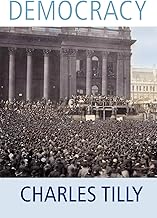Drum’s deficient democratic theory

Reading Drum’s disastrous posts while trying to plan a “Democratic Theory in the 20th and 21st century” syllabus for the Spring had me thinking about saying something about Drum’s implicit democratic theory and its shortcomings. Murc said a great deal of what I might have said with respect to the specific and concrete errors Drum makes, saving me the trouble, so I’ll just replace the first part of what I would have written with “what he said” and get on with the rest of it.
One of the games Drum is playing is playing fast and loose with two meanings of democracy: first, as an ideal (call it democracy-I), and second, as the name we give a big messy regime that has never lived up to the ideal and has a variety of democratic and undemocratic features competing with each other (call it democracy-BMR, as in ‘big messy regime’). It’s possible to imagine a time and circumstance in which (some) enhancements of democracy-I could be destabilizing and harmful to democracy-BMR. This situation might lead one to conclude that two options we need to choose between are “let’s postpone enhancing democracy-I for the sake of order and stability in the short/medium term” and “if it can’t handle more democracy-I so much the worse for democracy-BMR.” In certain times and places, which of these paths to choose should be treated as a live question without an obvious answer. But because it’s possible to imagine a time in which that was the trade-off we were facing is very different than establishing that we are in such a moment at present. This clearly seems to be the terrain on which Drum wishes to believe we currently find ourselves situated, but he doesn’t establish it. Indeed, the lazier parts of his post, well beneath the standards for accuracy and specificity he often holds himself, read as much as him trying to convince himself as anything else. Relevant for our purposes is that his effort to suggest we’re in such a moment necessitates muddying the conceptual boundaries between democracy-I and democracy-BMR. (This is part of the rhetorical the work “we’ve always had some gerrymandering and disenfranchisement, so it must be OK” is doing).
One source of constitutional/regime crisis is the always-present undemocratic features of a democracy-BMR overwhelming the democratic ones. This isn’t anything new or terribly unusual, it’s a major subset of the social/political phenomenon known as de-democratization. To state what should be, but evidently isn’t, obvious, in such a circumstance the kind of calculations and trade-offs discussed above become less relevant. Simply standing by and letting the undemocratic features of democracy-BMR overwhelm the democratic ones doesn’t protect the regime, it likely hastens and enables its transformation into something we have far less reason to value. Those of us who care about democracy-I as well as democracy-BMR have always hated and opposed gerrymandering and disenfranchisement, even when the regime appears on more or less stable footing. The current crisis doesn’t challenge that commitment that but enhances it–if we hope to get the democratic and undemocratic features of democracy-BMR into some kind of sustainable balance, we need to leverage whatever democratic processes are still functioning to deepen and expand the democratic features of democracy-I.
One of sharpest insights about democracy I’ve ever encountered comes from the brilliant Charles Tilly. Paraphrasing: Sorting regimes into two seemingly stable and discrete categories, “democracies” and “non-democracies”, is conceptually misleading, because any and all regimes, from Denmark to North Korea, are sites of constant, unending processes of democratization and de-democratization. The outward appearance of stasis, stability, and equilibria sometimes captures a rough balance between these forces, but that doesn’t mean they aren’t down there, churning away, and being thrall of that image distorts our ability to see these forces under the surface. States, of course, often want observers to be in thrall of that image of stability; it’s in their interests to project it. Those of us whose project it is to better understand politics need to develop a capacity to not have our attention and imagination captured by that image. In many cases, this is really hard. In the present case, however, it really isn’t: those processes of contestation have forced their way to the surface, requiring a deep ideological commitment to only seeing the image and being willfully blind to the possibilities behind it.


